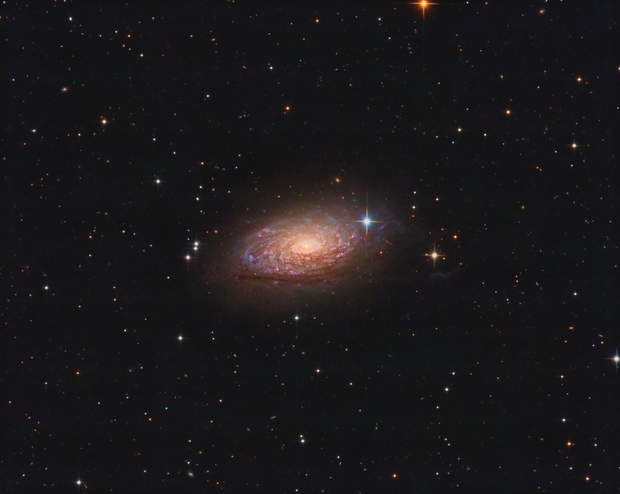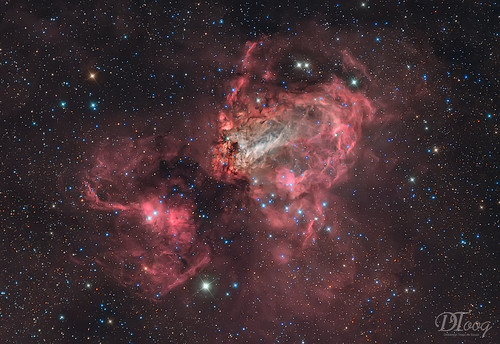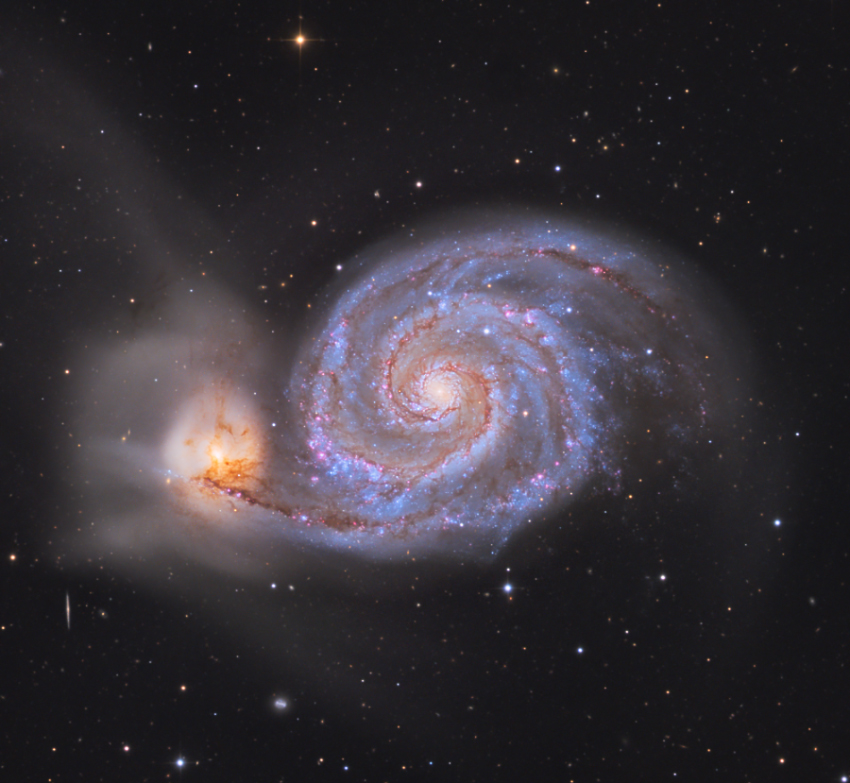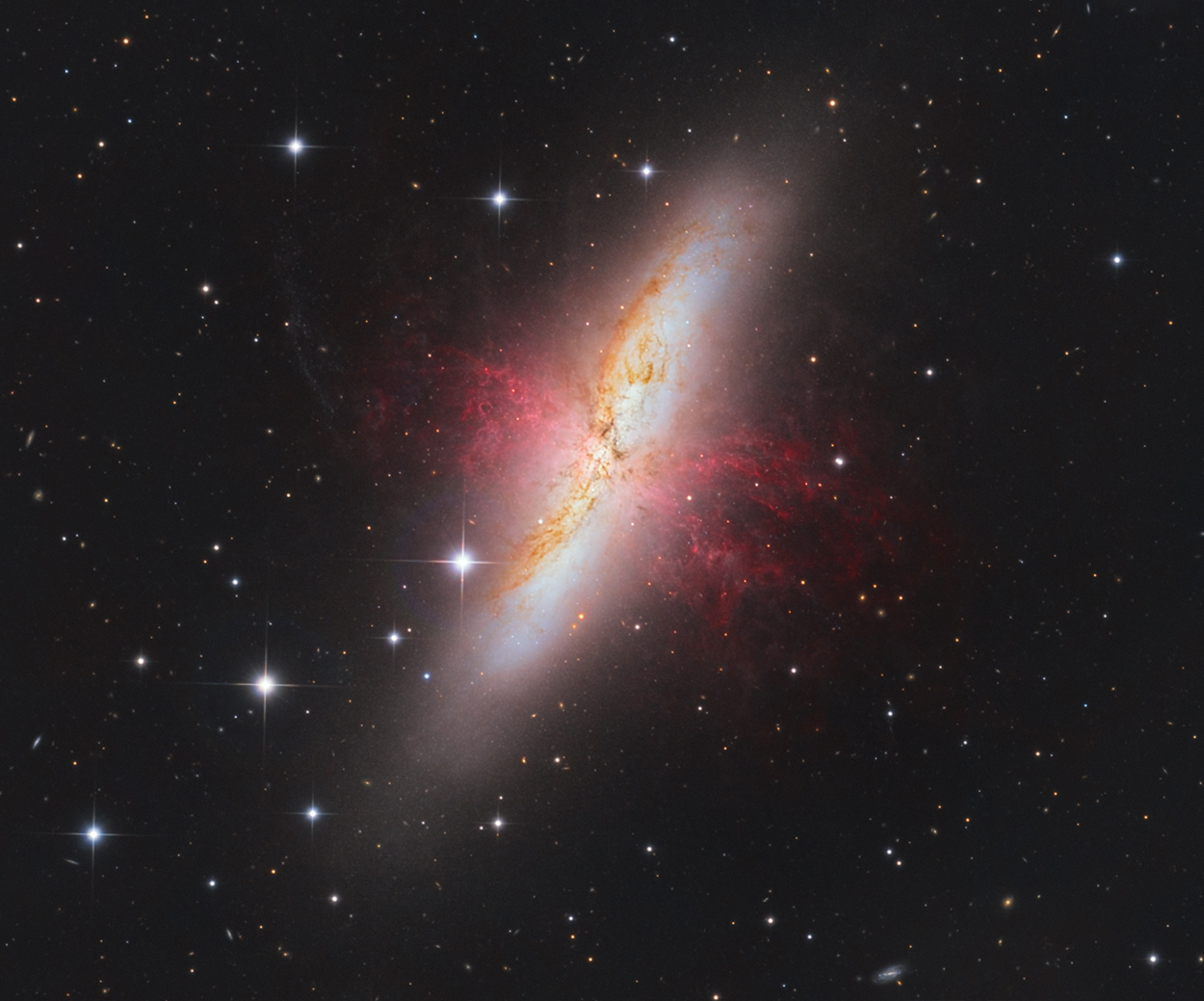 Leo Trio Galaxies - Luminance from T2 of Chilescope and RGB from previous images taken in Arizona by gc.iaffaldano, su Flickr
Leo Trio Galaxies - Luminance from T2 of Chilescope and RGB from previous images taken in Arizona by gc.iaffaldano, su FlickrSubmissions: 2020 May
-
Iaffaldano Giuseppe Carmine
- Ensign
- Posts: 54
- Joined: Sun Jun 18, 2017 10:13 am
- Location: TARANTO
Re: Submissions: 2020 May
Leo Trio Galaxies
 Leo Trio Galaxies - Luminance from T2 of Chilescope and RGB from previous images taken in Arizona by gc.iaffaldano, su Flickr
Leo Trio Galaxies - Luminance from T2 of Chilescope and RGB from previous images taken in Arizona by gc.iaffaldano, su Flickr
 Leo Trio Galaxies - Luminance from T2 of Chilescope and RGB from previous images taken in Arizona by gc.iaffaldano, su Flickr
Leo Trio Galaxies - Luminance from T2 of Chilescope and RGB from previous images taken in Arizona by gc.iaffaldano, su FlickrRe: Submissions: 2020 May
The Sunflower Galaxy
https://www.astrobin.com/a9pidz/0/
Copyright: Gabe Shaughnessy https://cdn.astrobin.com/thumbs/KzLB7xY ... GaXsse.png
https://www.astrobin.com/a9pidz/0/
Copyright: Gabe Shaughnessy https://cdn.astrobin.com/thumbs/KzLB7xY ... GaXsse.png
Last edited by bystander on Mon May 18, 2020 12:48 am, edited 1 time in total.
Reason: Please, no hot links to images > 500Kb. Substituted smaller image.
Reason: Please, no hot links to images > 500Kb. Substituted smaller image.
Re: Submissions: 2020 May
The Whirlpool Galaxy
https://www.astrobin.com/aqw69q/?nc=user
Copyright: Gabe Shaughnessy https://cdn.astrobin.com/thumbs/qK5-Pyk ... GaXsse.png
https://www.astrobin.com/aqw69q/?nc=user
Copyright: Gabe Shaughnessy https://cdn.astrobin.com/thumbs/qK5-Pyk ... GaXsse.png
Last edited by bystander on Mon May 18, 2020 12:49 am, edited 1 time in total.
Reason: Please, no hot links to images > 500Kb. Substituted smaller image.
Reason: Please, no hot links to images > 500Kb. Substituted smaller image.
-
Alson Wong
- Ensign
- Posts: 85
- Joined: Tue Sep 06, 2011 4:14 am
- Contact:
Re: Submissions: 2020 May
The Kangaroo
www.alsonwongastro.com
Copyright: Alson Wong The Kangaroo is an asterism in the constellation Boötes.
www.alsonwongastro.com
Copyright: Alson Wong The Kangaroo is an asterism in the constellation Boötes.
-
Alson Wong
- Ensign
- Posts: 85
- Joined: Tue Sep 06, 2011 4:14 am
- Contact:
Re: Submissions: 2020 May
felix_wegerer wrote: ↑Mon May 11, 2020 9:36 pm Heart and Fishhead Nebula 3 panel mosaic in SHO, taken in April 2020 from Linz, Austria. School Observatory. 30+h integration
Heart_Fish_SHO_crop.jpg
Hope you like it, clear skies!
Felix, that's a great mosaic of the Heart Nebula with superb detail.
Hope you don't mind that I see a dog in it!
Ann
Color Commentator
-
Manel Martín Folch
- Ensign
- Posts: 15
- Joined: Tue Jan 10, 2017 7:13 pm
Submissions:2020 May
Four panel mosaic of NGC7000, 27 h. total LRGBha exposure with FSQ106ED telescope from Àger, Spain
https://astrob.in/full/x2kzp3/0/
https://astrob.in/full/x2kzp3/0/
-
mdieterich
- Science Officer
- Posts: 100
- Joined: Fri Feb 13, 2015 5:50 pm
Re: Submissions: 2020 May
Messier 61 Supernova
www.mdieterichphoto.com
Copyright: Matt Dieterich and Nick Dunckel Pictured here is the beautiful Messier 61 galaxy that lies approximately 55 milion light years from Earth. I captured only 3.5 hours worth of images on the galaxy using a PlaneWave Instruments CDK600 from Observatory El Sauce (ObsTech) in Chile. Astronomers recently discovered a bright new shining star within this galaxy, which imploded upon itself in a massive fashion called a supernova.
www.mdieterichphoto.com
Copyright: Matt Dieterich and Nick Dunckel Pictured here is the beautiful Messier 61 galaxy that lies approximately 55 milion light years from Earth. I captured only 3.5 hours worth of images on the galaxy using a PlaneWave Instruments CDK600 from Observatory El Sauce (ObsTech) in Chile. Astronomers recently discovered a bright new shining star within this galaxy, which imploded upon itself in a massive fashion called a supernova.
-
KuriousGeorge
- Science Officer
- Posts: 218
- Joined: Wed Dec 30, 2015 7:07 am
- Location: San Diego, CA
- Contact:
Re: Submissions: 2020 May
Sombrero Galaxy (Deep). KG Observatory, Julian, CA.
During this time of the year we see very dark skies due to a marine layer at lower altitude. That along with less lights during quarantine allows us to see 21.7+ SQM skies. (-:
After seeing this deep exposure of the Sombrero Galaxy, I thought I'd try the same with the Planewave CDK24...
https://www.astrobin.com/lduc0b/E/
Now what you see here is tricky. Could some of this be due to my optics? Not sure, but the thick faint stem protruding down with the faint tail off to the right seems like a possible ancient migration?
Processing was minimized to preserve as much as possible with no deconvolution nor gradient removal. Flats were taken very carefully in a completely dark space with an Altinak Flat-Man panel.
Wondering if I should go deeper, especially if this may not be an optical artifact caused by the bright galaxy?
https://www.astrobin.com/ifvnh6/
During this time of the year we see very dark skies due to a marine layer at lower altitude. That along with less lights during quarantine allows us to see 21.7+ SQM skies. (-:
After seeing this deep exposure of the Sombrero Galaxy, I thought I'd try the same with the Planewave CDK24...
https://www.astrobin.com/lduc0b/E/
Now what you see here is tricky. Could some of this be due to my optics? Not sure, but the thick faint stem protruding down with the faint tail off to the right seems like a possible ancient migration?
Processing was minimized to preserve as much as possible with no deconvolution nor gradient removal. Flats were taken very carefully in a completely dark space with an Altinak Flat-Man panel.
Wondering if I should go deeper, especially if this may not be an optical artifact caused by the bright galaxy?
https://www.astrobin.com/ifvnh6/
Re: Submissions: 2020 May
I think that what your image shows is very real.KuriousGeorge wrote: ↑Tue May 19, 2020 1:13 am Sombrero Galaxy (Deep). KG Observatory, Julian, CA.
During this time of the year we see very dark skies due to a marine layer at lower altitude. That along with less lights during quarantine allows us to see 21.7+ SQM skies. (-:
After seeing this deep exposure of the Sombrero Galaxy, I thought I'd try the same with the Planewave CDK24...
https://www.astrobin.com/lduc0b/E/
Now what you see here is tricky. Could some of this be due to my optics? Not sure, but the thick faint stem protruding down with the faint tail off to the right seems like a possible ancient migration?
Processing was minimized to preserve as much as possible with no deconvolution nor gradient removal. Flats were taken very carefully in a completely dark space with an Altinak Flat-Man panel.
Wondering if I should go deeper, especially if this may not be an optical artifact caused by the bright galaxy?
https://www.astrobin.com/ifvnh6/
Compare your own image with this one by Benjamin Csizi.
Ann
Color Commentator
-
Elias Chasiotis
- Ensign
- Posts: 53
- Joined: Tue Aug 04, 2009 11:59 am
Re: Submissions: 2020 May
Good morning from Athens, Greece! In this photo from 19 May 2020, the sun rises through the ancient Greek temple of Godess Athena, the Parthenon, which means "the temple of the virgins". The atmosphere these days is exceptionally hazy due to high concentrations of dust, that originated from the Sahara desert. Thus, the dusty cloud visible on the photo. We experience the strongest heatwave ever recorded in May in Greece and the all time high of the country for the month was broken, as temperature reached 107F (42C).
Last edited by Elias Chasiotis on Tue May 19, 2020 1:38 pm, edited 1 time in total.
-
cappellettiariel
- Ensign
- Posts: 21
- Joined: Sat Aug 11, 2018 3:18 pm
Re: Submissions: 2020 May
Hi Everyone, good morning, I would like to share with you this image of M20 - Trifid Nebula LRGB from skies bortle 9
11.6 h of total integration, from Córdoba, Argentina
Main Equipment: ZWO ASI 1600 mm-pro + SW Explorer 250pds + SW Coma Corrector 0.9x + EQ6-R-Pro + ZWO EAF + ZWO EFW 7x2"
Guiding equipment: guidescope Starguider 60/240 mm, ZWO ASI 120mm mini
*Gain 100, -25 º C, R-CCD 2" Svbony + L-Pro 2" Optolong, 50x120"
*Gain 100, -25 º C, G-CCD 2" Svbony + L-Pro 2" Optolong, 50x120"
*Gain 100, -25 º C, B-CCD 2" Svbony + L-Pro 2" Optolong, 50x120"
*Gain 100, -25 º C, L 2" Optolong + L-Pro 2" Optolong, 197x120"
50 Darks
50 Flats / filter
Polar Align: SharpCap 3.2
Acquisition: SGP 3.1
Processing: Pixinsight 1.8.8, PS
Hope you enjoy it, clear skies!

M20 - Trifid Nebula LRGB from skies Bortle 9 (First Light of my new SW 254/1200 Nextonian Telescope) by Ariel Cappelletti, en Flickr
11.6 h of total integration, from Córdoba, Argentina
Main Equipment: ZWO ASI 1600 mm-pro + SW Explorer 250pds + SW Coma Corrector 0.9x + EQ6-R-Pro + ZWO EAF + ZWO EFW 7x2"
Guiding equipment: guidescope Starguider 60/240 mm, ZWO ASI 120mm mini
*Gain 100, -25 º C, R-CCD 2" Svbony + L-Pro 2" Optolong, 50x120"
*Gain 100, -25 º C, G-CCD 2" Svbony + L-Pro 2" Optolong, 50x120"
*Gain 100, -25 º C, B-CCD 2" Svbony + L-Pro 2" Optolong, 50x120"
*Gain 100, -25 º C, L 2" Optolong + L-Pro 2" Optolong, 197x120"
50 Darks
50 Flats / filter
Polar Align: SharpCap 3.2
Acquisition: SGP 3.1
Processing: Pixinsight 1.8.8, PS
Hope you enjoy it, clear skies!

M20 - Trifid Nebula LRGB from skies Bortle 9 (First Light of my new SW 254/1200 Nextonian Telescope) by Ariel Cappelletti, en Flickr
Last edited by cappellettiariel on Tue May 19, 2020 10:20 pm, edited 1 time in total.
-
KuriousGeorge
- Science Officer
- Posts: 218
- Joined: Wed Dec 30, 2015 7:07 am
- Location: San Diego, CA
- Contact:
Re: Submissions: 2020 May
Thanks Ann for the reference. That's what got me started on this. (-:
I hope to go deeper this week to focus on that faint wide "road" from the galaxy, through those 3 bright stars, and down to the bottom left.
-
markh@tds.net
- Science Officer
- Posts: 117
- Joined: Wed Oct 03, 2012 7:44 pm
Re: Submissions: 2020 May
Great Job!KuriousGeorge wrote: ↑Tue May 19, 2020 3:23 pmThanks Ann for the reference. That's what got me started on this. (-:
I hope to go deeper this week to focus on that faint wide "road" from the galaxy, through those 3 bright stars, and down to the bottom left.
I believe there is a loop at the top as well, but i have not been able to confirm, maybe you can try for that but you will have to alter the FOV.
Mark Hanson
-
markh@tds.net
- Science Officer
- Posts: 117
- Joined: Wed Oct 03, 2012 7:44 pm
Re: Submissions: 2020 May
Sorry, you can see mine here: https://www.hansonastronomy.com/m-104markh@tds.net wrote: ↑Tue May 19, 2020 5:20 pmGreat Job!KuriousGeorge wrote: ↑Tue May 19, 2020 3:23 pmThanks Ann for the reference. That's what got me started on this. (-:
I hope to go deeper this week to focus on that faint wide "road" from the galaxy, through those 3 bright stars, and down to the bottom left.
I believe there is a loop at the top as well, but i have not been able to confirm, maybe you can try for that but you will have to alter the FOV.
Mark Hanson
Re: Submissions: 2020 May
markh@tds.net wrote: ↑Tue May 19, 2020 5:22 pmSorry, you can see mine here: https://www.hansonastronomy.com/m-104markh@tds.net wrote: ↑Tue May 19, 2020 5:20 pmGreat Job!KuriousGeorge wrote: ↑Tue May 19, 2020 3:23 pm
Thanks Ann for the reference. That's what got me started on this. (-:
I hope to go deeper this week to focus on that faint wide "road" from the galaxy, through those 3 bright stars, and down to the bottom left.
I believe there is a loop at the top as well, but i have not been able to confirm, maybe you can try for that but you will have to alter the FOV.
Mark Hanson
Wow, Mark, that's absolutely amazingly stunning!!!
The superb detail in the visible disk of M104! The plethora of background galaxies! The wonderful background grand design spiral galaxy near a white foreground star! The beautifully resolved tidal tail, demonstrating that it is made up of stars and not of gas! That humongous faint featureless halo! All of it is totally fantastic!
Ann
Color Commentator
-
KuriousGeorge
- Science Officer
- Posts: 218
- Joined: Wed Dec 30, 2015 7:07 am
- Location: San Diego, CA
- Contact:
Re: Submissions: 2020 May
Thanks Mark! And thanks for pointing out your wonderful rendition. I often use your work for reference.markh@tds.net wrote: ↑Tue May 19, 2020 5:20 pm
Great Job!
I believe there is a loop at the top as well, but i have not been able to confirm, maybe you can try for that but you will have to alter the FOV.
Mark Hanson
I'm hoping to get more time on M104 this week while we still have 21.7 skies. I'll try to capture the upper part.
David Malin has the best I could find in that area...
https://www.aanda.org/articles/aa/full_ ... 11/F4.html
Re: Submissions: 2020 May
M51 - Whirlpool-Galaxie
Telescope: ASA EQ1000 f7 - ASA 1 m equatorial telescope
Location: Vega Observatory - House of Nature Salzburg, Austria
Camera: FLI Microline 16803
Exposure time: 28x7min. Luminance, 9x7min.RGB all unbinned
Copyright: Rochus Hess larger resolution
http://www.astrofotografie-hess.at/assets/m51_large.jpg
Website
http://www.astrofotografie-hess.at/
Telescope: ASA EQ1000 f7 - ASA 1 m equatorial telescope
Location: Vega Observatory - House of Nature Salzburg, Austria
Camera: FLI Microline 16803
Exposure time: 28x7min. Luminance, 9x7min.RGB all unbinned
Copyright: Rochus Hess larger resolution
http://www.astrofotografie-hess.at/assets/m51_large.jpg
Website
http://www.astrofotografie-hess.at/
Re: Submissions: 2020 May
M 82 ( Cigar Galaxy ) is a starburst galaxy approximately 12 million light-years away in the constellation Ursa Major
Telescope: ASA EQ1000 f7 - ASA 1 m equatorial telescope
Location: Vega Observatory - House of Nature Salzburg, Austria
Camera: FLI Microline 16803
Exposure time: 49x7min. Luminance, 35x20min Ha, 30x7min.RGB all unbinned
Copyright: Rochus Hess larger resolution
http://www.astrofotografie-hess.at/asse ... large2.jpg
Website
http://www.astrofotografie-hess.at/
Telescope: ASA EQ1000 f7 - ASA 1 m equatorial telescope
Location: Vega Observatory - House of Nature Salzburg, Austria
Camera: FLI Microline 16803
Exposure time: 49x7min. Luminance, 35x20min Ha, 30x7min.RGB all unbinned
Copyright: Rochus Hess larger resolution
http://www.astrofotografie-hess.at/asse ... large2.jpg
Website
http://www.astrofotografie-hess.at/
-
Marco Rapino
Re: Submissions: 2020 May
Hello everyone, this is my submission for May 2020.
It's a picture of the sun with data acquired back in 2014 when there was a high solar activity and it's the result of a cooperation between me (Marco Rapino) who I did the processing and Tommaso Martino who did the acquisition.
The equipment used was a Lunt60 B1200 with MagZero and a Barlow lens 2x.
The processing was done using Autostakkert, ImPPG and PixInsight for some final curves and color adjustments.
Video was shot from Italy, Castiglione della Pescaia, Tuscany.
Hope you like it!
Marco

It's a picture of the sun with data acquired back in 2014 when there was a high solar activity and it's the result of a cooperation between me (Marco Rapino) who I did the processing and Tommaso Martino who did the acquisition.
The equipment used was a Lunt60 B1200 with MagZero and a Barlow lens 2x.
The processing was done using Autostakkert, ImPPG and PixInsight for some final curves and color adjustments.
Video was shot from Italy, Castiglione della Pescaia, Tuscany.
Hope you like it!
Marco

-
markh@tds.net
- Science Officer
- Posts: 117
- Joined: Wed Oct 03, 2012 7:44 pm
Re: Submissions: 2020 May
Rochus,rhess wrote: ↑Tue May 19, 2020 6:51 pm M 82 ( Cigar Galaxy ) is a starburst galaxy approximately 12 million light-years away in the constellation Ursa Major
Telescope: ASA EQ1000 f7 - ASA 1 m equatorial telescope
Location: Vega Observatory - House of Nature Salzburg, Austria
Camera: FLI Microline 16803
Exposure time: 49x7min. Luminance, 35x20min Ha, 30x7min.RGB all unbinned
Copyright: Rochus Hess larger resolution
http://www.astrofotografie-hess.at/asse ... large2.jpg
Website
http://www.astrofotografie-hess.at/
M51 and M82 are beautiful, great job processing and love the resolution with the 1 meter!
Mark Hanson
- Robin_Onderka
- Ensign
- Posts: 47
- Joined: Sat Mar 07, 2020 6:54 pm
Re: Submissions: 2020 May
Humans and Nature
Panoramic photo of the Milky Way, which connects two "worlds" - people and nature, where nature is represented by trees and people by the houses in the background. Light pollution at the core of the Milky Way is caused by a very distant city, which, however, still has an impact on the visibility of the sky.
The photo is taken from a dark sky park in Beskydy Mountains in the Czech Republic, which, even when located near large cities, still adheres to quality.
Info: 11 panel panorama, 3 photos stacked to reduce noise (33 photos total)
EXIF: 14 mm | f/2.8 | ISO 6400 | 20" from tripod
Gear: Canon 6D Astro modified + Samyang 14 mm f/2.8
 Humans and Nature by Robin Onderka, on Flickr
Humans and Nature by Robin Onderka, on Flickr
Panoramic photo of the Milky Way, which connects two "worlds" - people and nature, where nature is represented by trees and people by the houses in the background. Light pollution at the core of the Milky Way is caused by a very distant city, which, however, still has an impact on the visibility of the sky.
The photo is taken from a dark sky park in Beskydy Mountains in the Czech Republic, which, even when located near large cities, still adheres to quality.
Info: 11 panel panorama, 3 photos stacked to reduce noise (33 photos total)
EXIF: 14 mm | f/2.8 | ISO 6400 | 20" from tripod
Gear: Canon 6D Astro modified + Samyang 14 mm f/2.8
 Humans and Nature by Robin Onderka, on Flickr
Humans and Nature by Robin Onderka, on FlickrRe: Submissions: 2020 May
I absolutely love this image of circa 4 billion-year-old open cluster M67 and its many-colored stars. As a lover of all things blue, I am of course delighted to find a true blue B-type star, HIP 43465, a blue straggler, in this cluster (at bottom right). Note that there are a few other relatively blue stars in M67, and note the striking scarcity of blue stars in the field.tommy_h wrote: ↑Tue May 12, 2020 8:03 pm Messier 67
http://www.distant-lights.at/m67-2020_02_19.htm
Copyright: Thomas Henne
M67 rules, and this is a superb photo, Thomas!
Ann
Color Commentator







